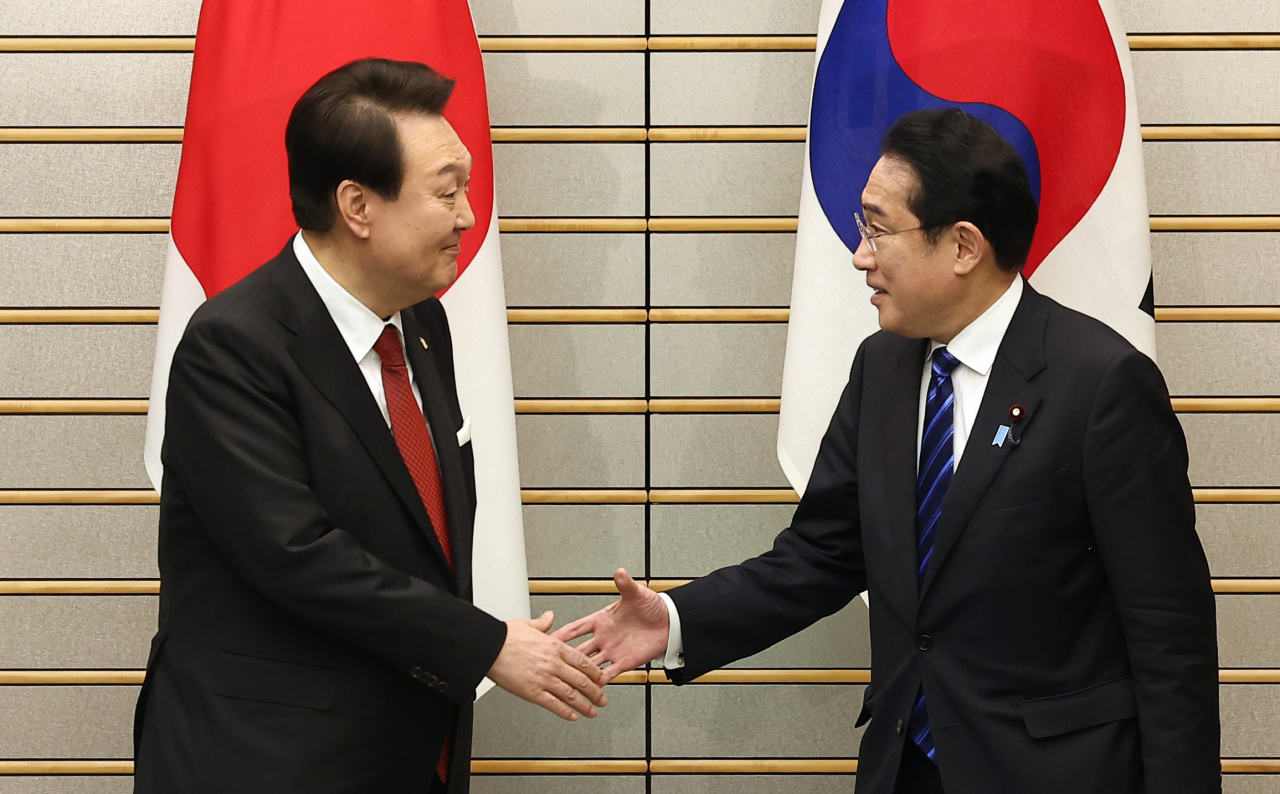A week after summit with Biden, Yoon to meet Kishida in Seoul
Kishida likely to discuss trilateral security cooperation with Yoon, but will face unfriendly public, experts say
By Shin Ji-hyePublished : May 2, 2023 - 15:13

Japanese Prime Minister Fumio Kishida is coming to Seoul on Sunday for a summit with South Korean President Yoon Suk Yeol, shortly after Seoul and Washington reaffirmed their "ironclad" alliance to deter North Korean threats during Yoon’s state visit to the US last week.
Confirming Kishida's visit, the South Korean presidential office said Tuesday that his two-day official visit will resume "shuttle diplomacy" between the two countries which had been suspended for last 12 years due to strained ties over historic disputes.
The two will hold a summit on Sunday, the office said, without providing details of Kishida's other engagements in Seoul. He will be accompanied by his wife, first lady Yuko Kishida, it added.
The presidential office said Yoon and Kishida are expected to discuss diverse issues, including security, economic cooperation, Korea-Japan relations, North Korea, and regional and international affairs.
Ahead of Kishida's visit, security chiefs from Korea and Japan, Cho Tae-yong and Takeo Akiba, were to meet on Wednesday in Seoul to discuss the agenda for the Korea-Japan summit.
The Japanese leader's visit to South Korea, which comes earlier than expected, is likely to focus on enhancing trilateral security cooperation, according to experts. He is also likely to face the Korean public, who is largely unconvinced that Seoul can mend ties with Tokyo without the latter's apology for wartime atrocities, they added.
During Yoon’s state visit to US, he and his US counterpart, President Joe Biden, adopted a nuclear accord dubbed the Washington Declaration and declared their alliance the “closest ever.” This appears to have influenced Kishida's decision to bump up his visit to Seoul to an earlier date, according to Lee Won-deog, a professor of Japanese studies at Kookmin University.
“It appears that Kishida may have felt pressure due to Biden's positive assessments of Yoon's diplomatic efforts with Japan and his emphasis on the importance of establishing a Korea-US-Japan security system,” Lee said.
During a joint press conference held after the summit last Wednesday, Biden expressed his appreciation and gratitude to Yoon for his "political courage and personal commitment" to diplomacy with Japan.
“The Korea-US summit seemed to have resulted in closer ties between the two countries, while Japan appeared to be relatively distant,” Lee said.
“Also, in the United States, there is a perception that South Korea has made significant concessions, while Japan has been too passive.”
Yoon and Kishida agreed to resume shuttle diplomacy at a summit held in Tokyo in March. Kishida was widely expected to visit Seoul after June.
Anticipation is growing for whether Yoon and Kishida will discuss Japan’s involvement in the South Korea-US Nuclear Consultative Group, and expand it as a trilateral platform.
At the South Korea-US summit, Yoon and Biden made a joint declaration announcing the establishment of the nuclear consultation group. This group ensures South Korea's participation in the decision-making process related to the provision of extended deterrence by the United States in the event of emergencies, such as the threat of North Korean nuclear missiles.
However, the head of South Korea's National Security Office, Cho Tae-yong, said that trilateral security cooperation based on the Washington Declaration is “too early.” In an interview with local news broadcaster YTN, Cho said Monday that the first thing to do is to establish and stabilize the bilateral system between South Korea and the US and to make detailed discussions.
Park Won-gon, professor of North Korean studies at Ewha Womans University, said the South Korean government appears to be very cautious when it comes to talking about security cooperation with Japan, as the Korean public is not fully behind Yoon’s attempt to fast-track normalizing bilateral ties.
“Normalization between the two countries should come first before they could talk about the trilateral security cooperation at the Group of Seven later this month,” he said.
“We have already given a lot to Japan, and Koreans think that it is now their turn to give,” Park said. But he is uncertain whether Kishida will fulfill Koreans’ expectations and provide them with what they desire.
Choi Eun-mi, a research fellow at the Asan Institute for Policy Studies, also voiced concerns that Kishida's visit could stir up anti-Japanese sentiment.
"Yoon's visit to Japan and Kishida's visit to Korea are quite different," Choi said.
"Yoon was able to visit Japan under a relatively positive atmosphere, but it will be different for Kishida's visit to Korea. There will likely be protests from anti-Japanese groups and victim support organizations."
"If Kishida does not bring anything that South Korea expects, Koreans will question the purpose of his visit to Korea. Conversely, Japan may also regret the visit," Choi said. "This could potentially create a vicious cycle.”
"I am somewhat concerned that (the impact of) Kishida's visit on Korea may be significantly underestimated," she said.



















![[Today’s K-pop] Treasure to publish magazine for debut anniversary](http://res.heraldm.com/phpwas/restmb_idxmake.php?idx=642&simg=/content/image/2024/07/26/20240726050551_0.jpg&u=)